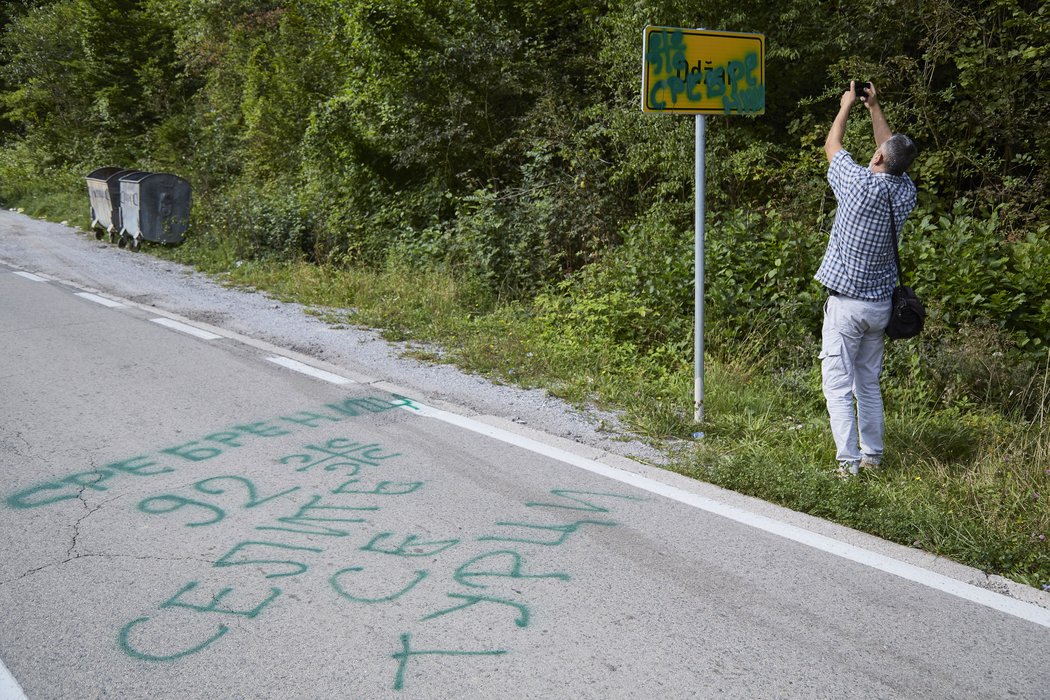
Peaceful Assembly
As the government has been preparing for the implementation of the Law on Same-Sex Communities, which legalised LGBTI marriages without adoption, on 17th June 2021, NGOs Queer Montenegro and Juventas organised a protest in front of the Parliament, demanding that the government harmonise all 26 laws with the Law on Life Partnership of Persons of the Same Sex by 15 July 2021, so that LGBTI people can enjoy basic human rights as guaranteed by that act. To date only three laws have been harmonised.
🏳️🌈👬❤️👭🏳️🌈 Gledajte ove divne ljude! Oni su matičarke i matičari koji će uskoro sklapati životna partnerstva lica istog pola ili rukovoditi timovima matičara koji će to raditi, iz Podgorice, Cetinja, Bijelog Polja, Mojkovca, Budve, Bara, Ulcinja i Herceg Novog. 🏳️🌈👭❤️👬🏳️🌈 pic.twitter.com/NuMa6RJXDn
— Danijel Kalezić (@DanijelKalezic) July 2, 2021
On 18th June 2021, Montenegrin police prevented a clash between protesters from both sovereignist and pro-Serbian background, during a premiere of a movie by Boris Malagurski in the main temple of the Serbian Orthodox Church in Podgorica. The film, which is considered anti-Montenegrin propaganda, enraged the patriots. On the same day the pro-Serb crowds were provoked by a silent feminist performance under the name “Lets heal Orthodoxy”, asking for a religious community that does not spread nationalism. The feminist group was verbally abused and spat on by the protesters.
Anti-fascistand sovereignist-patriotic protests were staged in several cities in mid-June 2021. An incident occurred at the main church in Cetinje, where local citizens accused the Serbian Orthodox Church of malpractice, while pro-Serbs were calling for the defence of the cherished Serbian heritage site.
On 21st July 2021, citizens protested against the changes of school directors by the government, claiming that the move is a promotion of Serbian interests in Montenegro and an expression of gratitude for the role that the Serbian Orthodox Church played in the elections which brought a pro-Serb coalition into power. The protesters demanded that the minister of education be removed from her position because of the appointment.
Expression
The Media Pluralism Monitor 2021 positioned Montenegro as a country with a medium risk for the protection of freedom of information, right to information and observing journalistic standards. However, Montenegro was ranked best of the Balkan countries for media plurality, which evaluated transparency of ownership, news media concentration and owners’ influence on editorial policies.
On the conference“Media Freedom: Yesterday, Today, Tomorrow”, Tamara Srzentic, Minister of Public Administration, Society and Media stated that the government is focused on the reform of media legislation and improving the protection of journalists’ rights and integrity.
At the third round table “Improvement of media legislation in Montenegro”, political parties supported the amendments to the Criminal Code requested by NGOs and media associations in order to toughen penalties for attacks on journalists. The increase in penalties for attacks on journalists was also proposed by MP Marko Milacic, which was welcomed by NGOs who have been advocating for this change for many years now.
Related to attacks on journalists, the Basic State’s Prosecutor’s office has filed an indictment against two people for a violent attack committed against TV Vijesti journalist Sead Sadikovic. However, Sadikovic claimed that more people were involved in the beating, which took place when he was reporting from a patriotic rally on 20th March 2020.
The investigation over the murder of Dusko Jovanovic, editor in chief of daily newspaper Dan has been reopened 17 years after his death in 2004. The prosecutor announced the questioning of new witnesses over the high-profile case.
In a separate development, one of the parties of the ruling coalition demanded that the movie “Quo vadis Aida” be taken off the Green Montenegro International Film Festival programme, claiming it collectively accuses Serbs of genocide in Srebrenica. As a result, the organisers moved the film to the festival’s online platform because of the potential that the screening may lead to incidents and protests, and to ensure that the tourist season does not suffer further.